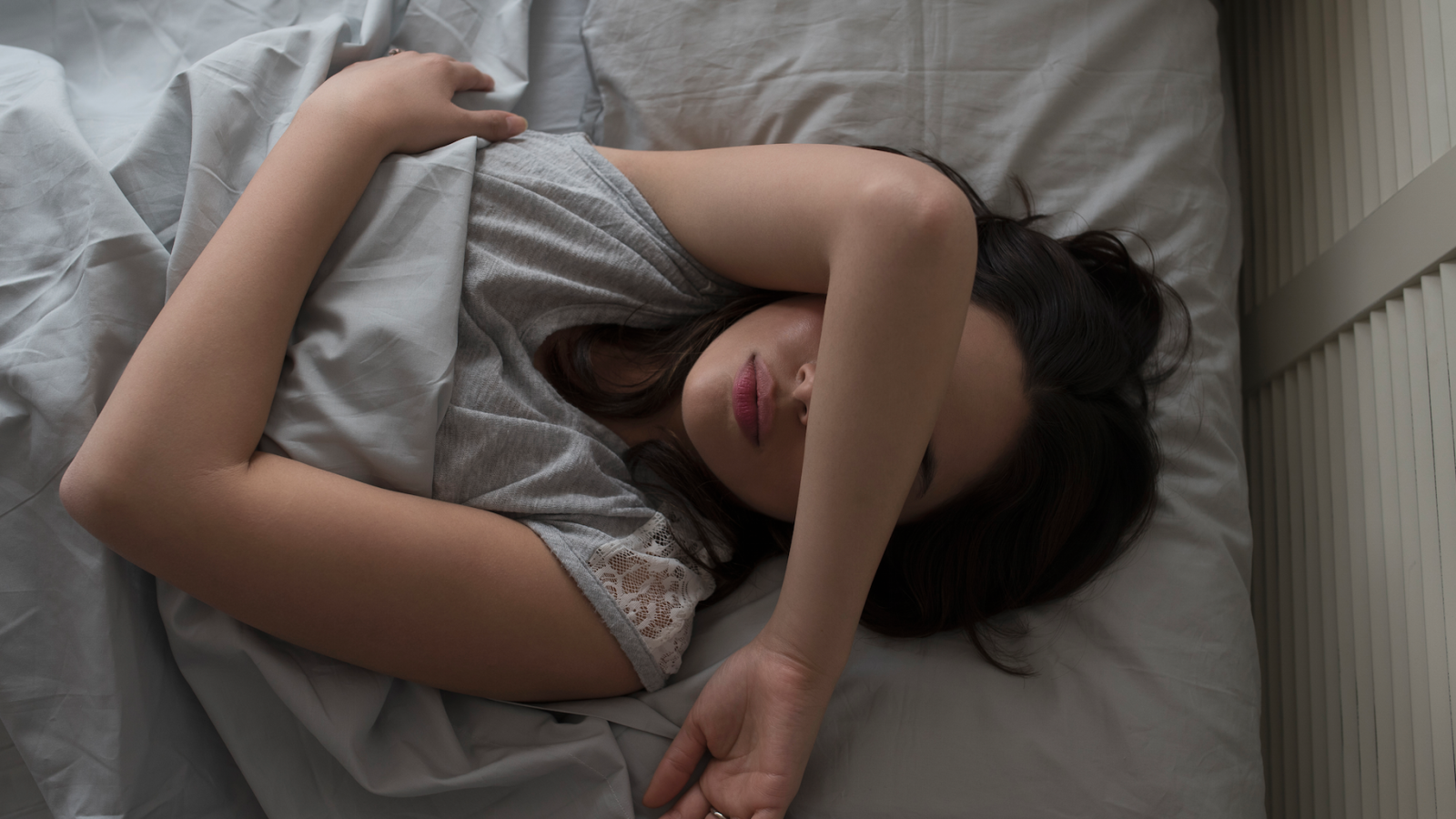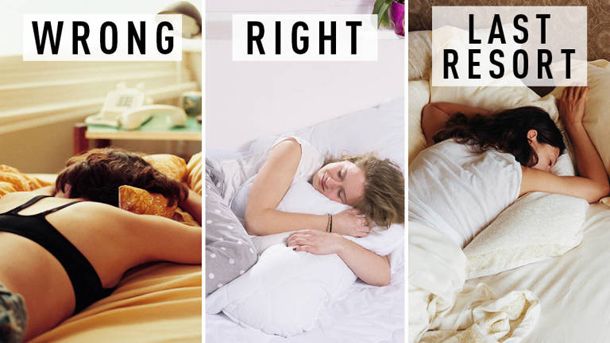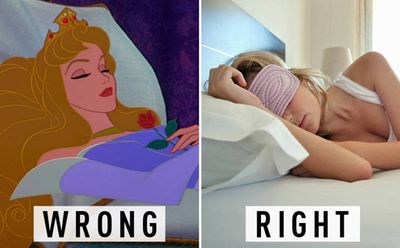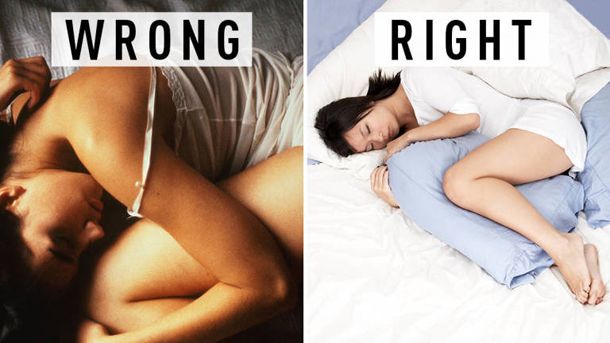18 Ways You're Sleeping Wrong
Correct these mistakes ASAP to sleep better.


Even if you eat kale and exercise and somehow resist the office cupcakes, it won't matter much if you don't get a decent amount of sleep. Your body and mind desperately needs rest to function properly. If only it were as easy as shutting your eyes. Take a look at your sleep habits to find out whether you're making these major mistakes, and learn how to fix them:
1. You swear by your sleep tracker. "You don't need a health tracker to find out if you've had a good night sleep," says Matt Leve, physical therapist at Shift PT in New York City. You know that feeling you get when you wake up on vacation? It's called refreshed, and it's how you should feel every. Single. Day. The American Academy of Sleep Medicine (AASM) recommends adults get about seven to nine hours of quality nightly sleep for optimal health, productivity, and daytime alertness. Even if your tracker says you've slept enough, if you generally wake up groggy, absolutely require caffeine to function, or doze off throughout the day, you're not getting adequate sleep.
2. You only use your pillows for your head. If you sleep on your back, wedge one under your knees to take pressure off your lower back. Or if you sleep on your side, wedge a pillow underneath your top armpit to support your arm and one between your legs to keep your spine aligned:
3. You sleep on your stomach. Sleeping facedown can cause some obvious issues — like not being able to breathe, for example. Because you need to turn your head to one side to get air in and out, you inherently twist your spine. Over time, this can cause neck and back pain (not to mention issues falling and staying asleep), says Ilene Rosen, M.D., an associate professor of clinical medicine for the University of Pennsylvania School of Medicine in Philadelphia and member of the board of directors for the AASM. To straighten your spine, bend the elbow and knee on the side you typically turn your head toward, and wedge a pillow underneath that armpit and hip. If you tend to kick the pillows and wake up flat on your stomach, tape a tennis ball to the front of your pajama shirt to teach your sleeping self not to roll. And if you really can't sleep in a modified position? Wedge a thin pillow under your abdomen to take pressure off your back:

4. You booze it up before bedtime. While drinking at night can help you doze off at first, it can also cause you to wake up throughout the night, which will ultimately interfere with the quality of your sleep, according to a comprehensive review of existing research that was published last year. The more you drink, the worse you're going to sleep. If you plan to throw back more than a few stiff ones, start early and slow down toward the end of the night.
5. You don't have a bedtime. When you crash hard at 9 p.m. on Monday night and stay up all night Tuesday to binge-watch your Netflix queue, your body won't know when to shut down on Wednesday night. A consistent sleep schedule helps your body know when it's time to fall asleep and wake up, Leve says. Read: It makes mornings less painful.
6. You sleep in on weekends. Think you can run on no sleep all week and catch up Saturday morning? Leve says it doesn't work like that. Recent research suggests skimping on sleep can actually lead to permanent brain damage that can compromise your alertness and brain power — and binge-sleeping can't mend that.
Stay In The Know
Get exclusive access to fashion and beauty trends, hot-off-the-press celebrity news, and more.
7. You go to sleep on a full stomach. Whenever you eat dinner less than three hours before bedtime, you put yourself at risk for heartburn and indigestion, which can make it tough to doze off, according to research published in the American Journal of Gastroenterology. Keep late-night snacks light, and always avoid fatty, fried, or spicy foods before bed.
8. You sleep on a super-fluffy pillow. Amazing for pillow fights:

But awful for back sleepers. Ideally, your pillow should elevate your head and neck just enough to keep your spine straight while you sleep. Pillows that raise your head more than a few inches cause you to round your head and shoulders forward. You can get away with a slightly higher pillow when you sleep on your side, because there's more room to fill between the side of your head and the mattress when you lie in that position:

At the end of the day, the best pillow will be the one with the best return policy. It's almost impossible to tell whether a pillow will be comfortable before you take it home — even if you test it on a bed in the store, the softness of your own mattress will affect how your body relates to the pillow. When you do take it home, ask your partner or roommate to look at you and touch along your spine. If it's not straight when you lie on the pillow in your typical position? Next! Any spinal curves will ultimately compress the discs in your spine or pinch the nerves, and result in pain.
9. You sleep in fetal position. This side-sleeper tendency can restrict your breath and compromise the quality of your sleep, Leve says. Wedge a body pillow under your top arm and leg to unwind your limbs and lengthen your spine. Even if you kick it away at some point during the night, you'll at least get some good quality sleep. (Or rest assured that you tried.)

10. You sleep on a mattress that's older than you. Most inner spring mattresses only last for five or 10 years, max, depending on the quality of your mattress, your weight, and how much time you spend in bed. If yours has a large indentation in the middle, or your body sags into the mattress when you lie on it, you'll likely wake up with lower back, hip, or shoulder pain. A foam cover or a new mattress can help.
11. You sleep in synthetic materials. That goes for both lingerie and bedding: Foam mattresses, sateen sheets, and satin PJs may feel good. But they retain body heat more than natural materials, which can amount to a temperature change that wakes you up, Leve says. Always sleep in sheets and pajamas made of cotton, bamboo, or natural fiber. If you have a foam mattress, use a wool mattress topper that's at least a half an inch thick. It will wick away body moisture so you don't wake up with the sweats.
12. You sleep on a mattress that's too soft. Sorry, Goldilocks, there's no perfect mattress — it all depends on your frame and weight and personal preference. That said, yours is probably too soft if you feel like you sinking into it. If your pelvis drops more than a few inches, you could suffer from lower back pain, Leve says.
13. You sleep on a mattress that's too hard. If your body doesn't sink at all, you could develop a curve in the spine that causes a stiff back and shoulders or hip pain in the morning, Leve says. Buy a foam mattress cover to make it a little more forgiving.
14. You sleep with your phone, or use your computer or TV before bed. These screens emit blue light that activates your brain and interferes with your body's natural sleep cycle, Leve says. The phone thing is one of the worst: If you get a text or email in the middle of the night — even after you close your eyes — the light can go right through your eyelids and stimulate your nervous system and brain. So you can kiss your deep, restorative sleep good-bye. Ideally, leave your phone outside your room while you sleep. If that's not an option, put it in silent mode with the screen facing down on a surface that's far from your bed. As for TV? Tune out an hour or two before bed to give your brain a chance to rest, and when you say your prayers? Remember to thank DVR.
15. You sleep in a room with no blinds. Light is a product of modern civilization, and humans aren't designed to bask in glaring streetlights while they sleep. "Try black out shades — they're the best thing you can do for your brain," Leve says. A sleep mask can help too.
16. You sleep in a room that's too hot or cold. Temperatures above 75 degrees Fahrenheit and below 54 degrees will disrupt sleep, according to the National Sleep Foundation. Recent researchsuggests that sleeping in a room that's about 66 degrees can increase your metabolism. (Just sayin'.)
17. You get in bed with dirty feet. This stinks up your sheets, and if you wear sandals or walk barefoot around the house, it can redeposit the dirt and dust you picked up throughout the day onto the bottom of your bed. (Gross.) A warm bath or shower will fix that. Plus, it will raise your body temperature, so by the time you tuck in, your temperature naturally will be dipping back down, which gets your body into sleep mode so you fall asleep faster.
18. You sleep with your pet. Sixty-three percent of pet owners who sleep beside their pets sleep poorly more often than not, according to research presented at a recent Annual Associated Professional Sleep Societies meeting. Hope Fido likes the floor.
Follow Marie Claire on Facebook for the latest celeb news, beauty tips, fascinating reads, livestream video, and more.
Elizabeth Narins is a Brooklyn, NY-based writer and a former senior editor at Cosmopolitan.com, where she wrote about fitness, health, and more. Follow her at @ejnarins.